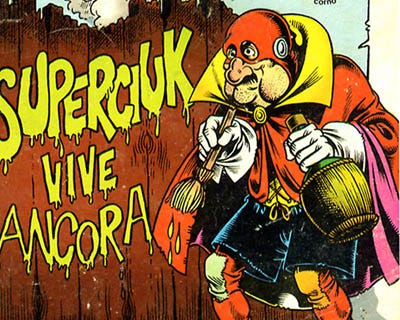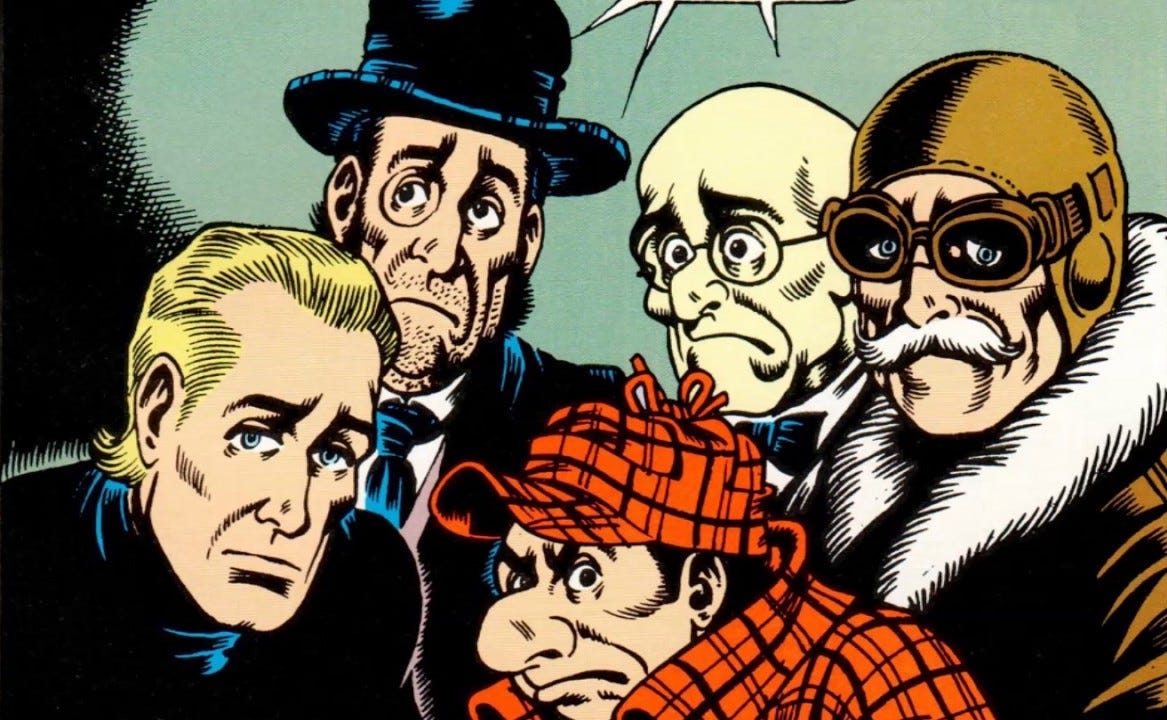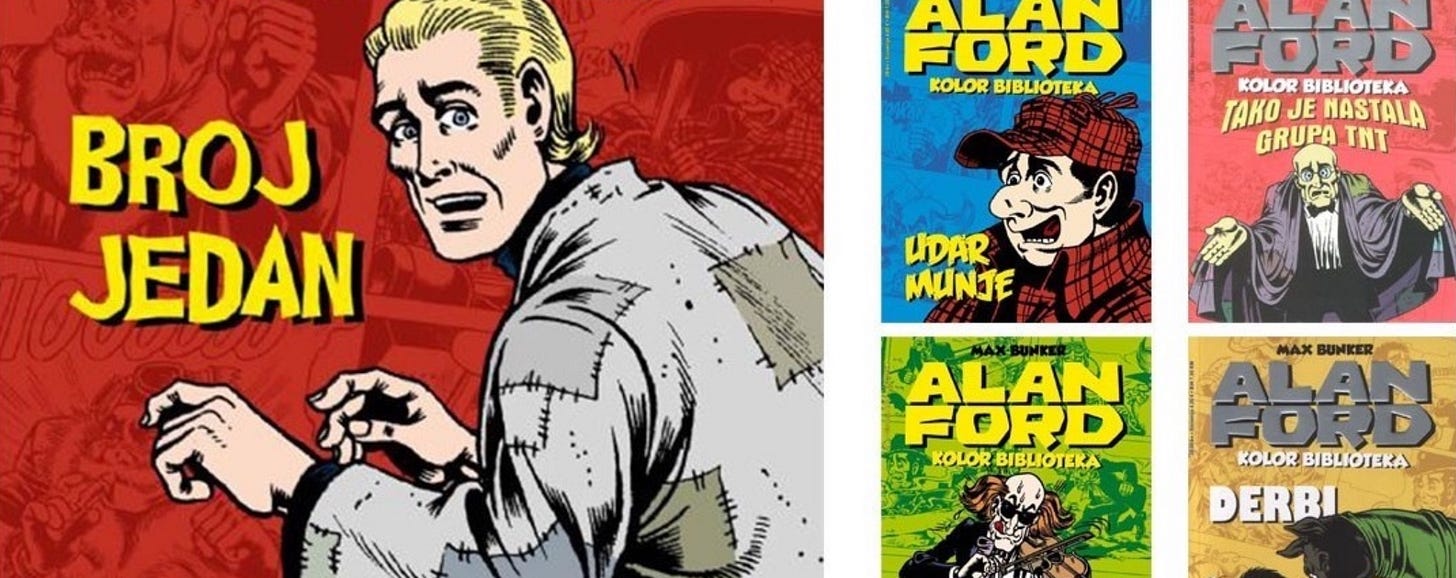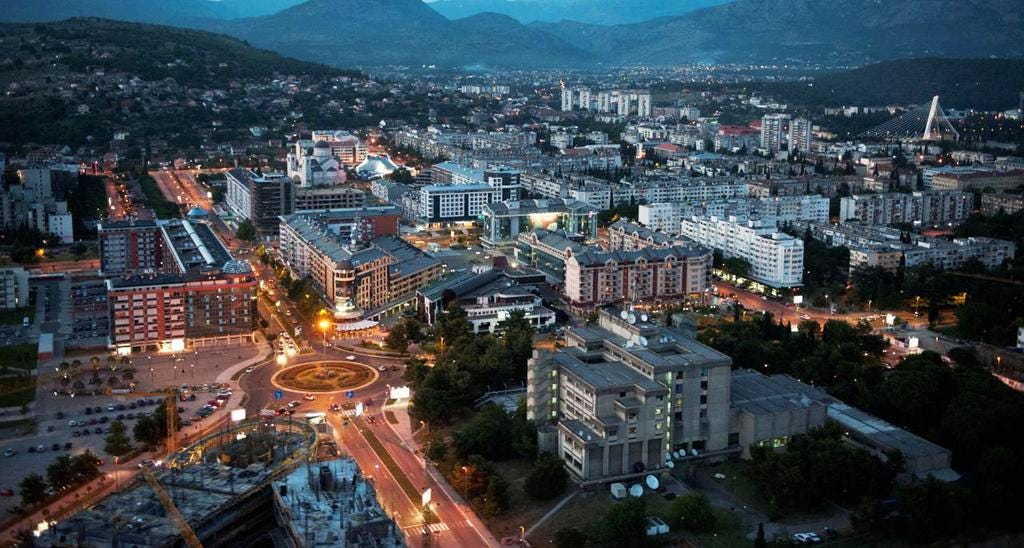XLVII. The land of comics
"Alan Ford", Italian comic book from the Seventies, is all the rage in the Balkans. But Superciuk, who steals from the poor and gives to the rich, is also the symbol of corruption in Montenegro
Hi,
welcome back to BarBalkans, the Italian newsletter whose aim is to give a voice to the Western Balkans’ stories, on the 30th anniversary of the Yugoslav Wars.
We have been exploring almost every field now: basketball and chess, legal marijuana and cinema, gastronomy and video games, football and music.
So far we have not talked about comics. The time has come.
We will do it our way, a bit metaphorically: talking about a curious cultural trend in the region and a particular case of one Balkan country.
President Milo Đukanović’s Montenegro.
Superciuk’s Montenegro.
A golden oldie
Let’s take a step back and try to understand the general context.
Have you ever heard of Alan Ford?
Probably not. It depends on your age and your interests.
Alan Ford for is an Italian comic book, typeset since 1969. It was created by Max Bunker (Luciano Secchi) and Magnus (Roberto Raviola).
It tells the story of the Group TNT, a ramshackle gang of secret agents based in a flower shop in New York and headed by an elderly man in a wheelchair, Number One.
Alan Ford is one of the protagonists and, by extension, gives the name to the comic book. He is an advertising graphic designer with no great prospects, who entered the Group TNT almost by mistake.
The character of Alan Ford was designed on the British actor, Peter O’Toole, but he is a full-fledged anti-hero: fearful, naive and lacking particular qualities.
These characteristics distinguish all the members of Group TNT, formed by Sir Oliver, Grunf, Bob Rock and Jeremiah. The recurring theme is the inadequacy of the gang, the economic hardship and the improbable strokes of luck.
Actually, the plot is just a pretext to show the struggle with the problems of daily survival. The people - proletarians, bourgeois and capitalists - are represented with all their faults in a degraded moral context.
Alan Ford is still being published. However, the peak of success was reached between the Seventies and Eighties.
It became very popular also in Yugoslavia and even today is one of the most famous comic books in the Balkan countries.
This surprising success in the Balkan region is largely due to Nenad Brixy’s great ability as a translator. A brilliant work that made it possible to adapt the spirit of the Italian series into the Serbo-Croatian language.
Until his death in 1984, Brixy was able to find good alternatives to humor, wordplays and non-translatable references.
Daniele Onori, responsible of the Italian embassy in Sarajevo’s Culture office until 2015, explained that «Brixy was able to convey Max Bunker’s Milanese specificity by adopting a Zagreb jargon». A solution that «was exotic but also very funny to non-Croatian Yugoslav people, in particular to Serbs and Bosnians».
That is why Alan Ford penetrated in Serbo-Croatian speaking countries: Serbia, Croatia, Bosnia and Herzegovina, Montenegro and Kosovo. Not everywhere in Yugoslavia, «but only in the Republics where the same language was spoken, with some variations».
To tell the truth, Macedonian and Albanian editions have also been made, but they have not been very successful: «Without the work of Brixy, who discovered Alan Ford and first proposed it to the Croatian publishing house Vjesnik, probably nothing would have happened», Onori confirms.
In the countries where it was successful, Alan Ford had a significant cultural impact. Idioms, such as “it is better a living coward than a dead hero” and “it is always better to win than to participate”, have entered the collective imaginary.
The peculiar spread of Alan Ford in the Balkans also has another reason.
In an interview for Calvert Journal (a magazine on the culture of the countries belonging to the former Soviet block), the Croatian publisher Ivan Sršen, emphasized how the comic book represents Yugoslav socialism in an involuntary but effective way:
«There is something that is both brutal and gentle in Magnus’ drawings. It is a dualism that was also present in the Yugoslav socialism: ideals and faith in a better future, contrasting with a gray and cynical reality».
The writer and journalist Lazar Džamić added that «the chaotic, dysfunctional and full of incompetent characters’ atmosphere was very similar to Yugoslavia in the Seventies and Eighties».
In some ways, the old Number One was associated with Marshal Josip Broz “Tito”, President and master of Yugoslav political life until his death in 1980 [if you want to know more, you can find it the 27th episode, “New Year’s Eve with Tito”].
Superciuk’s Montenegro
One of the most well-known enemies in the Alan Ford universe is Superciuk. A very particular villain (and how could it be otherwise?), like an anti-Robin Hood of sorts.
We will discover all his characteristics later at our bar, the BarBalkans. For now, we just need to know that he steals from the poor and gives to the rich.
And now let’s take a step forward.
In Montenegro - one of the Balkan countries where Alan Ford is very popular - Superciuk is not only a fictional character, but also the symbol of a widespread corruption.
Stealing from the poor and giving to the rich.
Until December 2020, this was exactly what happened: houses and apartments that could be given to those in need, were instead handed over by the government in Podgorica to wealthy officials who already had home ownerships.
25 million euros in subsidized loans to 580 prosecutors, judges, magistrates, officials and ministers.
«The list of beneficiaries will soon be revealed», Vanja Ćalović Marković, head of the National Council for the fight against high-level corruption, announced.
However, some information has already been leaked. The former President of the Constitutional Court, Vesna Medenica, but also prosecutors Saša Čađenović, Veselin Vučković and Lidija Vukčević are involved in the scandal.
There are also 5 prosecutors of the Specialist Prosecutor’s Office, 4 of the Supreme Prosecutors’ Office, 4 judges of the Administrative Court, 4 of the Supreme Court and 4 of the Constitutional Court, plus their respective Presidents.
The current President of Montenegro, Milo Đukanović, father and master of the country for 30 years, allegedly weaved his web of corruption.
He may have succeeded thanks to his undisputed sway, personal or channeled through his Prime Ministers from the Socialist Democratic Party (SDP). Duško Marković is the last in chronological order.
Even after the defeat of PDS in the legislative elections on August 30, 2020, the preferential treatment to 120 officials - who were involved in the three months of technical mandate - continued.
It seemed a kleptocratic regime, which kept the judicial system under control at all levels, from the prosecutors’ offices to the courts.
It is no coincidence that the negotiations for accession of Montenegro to the European Union are stuck on chapters 23 and 24, precisely those concerning the judicial system.
For now, the new government led by Zdravko Krivokapić cannot intervene on the corruption case, because Chief Prosecutor Ivica Stanković and Special Prosecutor Milivoje Katnić do not seem willing to open the investigation.
In other words, we must wait for the approval of the justice reform by the Parliament and the resumption of negotiations with the new methodology for EU accession.
Bribe me with a house
There is a red thread in the apartment affair. Most of the funding or aid amounted to 40 thousand euros. Only 15/20% of these subsidized loans had to be paid back.
Therefore, the apartments were not directly handed over, but they were sold at a price ten times lower than the market price.
Moreover, it was possible to trade houses owned in the province (which were over-valued), with high-quality apartments in the capital city (which were depreciated).
«This is only the continuation of an old practice, which lasted for at least ten years», Ćalović Marković accuses. She relies on information provided «by the Secretary General of the government, the reports of the Protector of Property and Legal Interests and over 50 notaries».
A few examples.
Let’s start with the former President of the Supreme Court. In 2017 Vesna Medenica allegedly asked for a financial support of 30 thousand euros from the government commission: she may have received 40 thousand euros in loan, only 8 thousand at her expenses.
At the time, Medenica already owned a house of 146 square meters and her income was 40 thousand euros (7 times the average wage in Montenegro). If this is not enough, in 2015 she allegedly donated her daughter an 80-square-meters apartment in the same way.
The former Minister of Culture, Branislav Mićunović, would have obtained a 75-square-meters apartment in Podgorica for less than 11 thousand euros as a “space for artistic creation”. He already owned one of 187 square meters, plus a commercial space of 222.
The former Education Minister, Damir Šehović, in 2019 may have obtained an 89-square-meters apartment for around 23 thousand euros. Much lower prices than the market price, ça va sans dire.
According to the head of the National Council for the fight against high-level corruption, this is just the tip of a much larger submerged iceberg: «You will be surprised to discover all those who solved their housing “problems” thanks to taxpayers’ money».
To establish the responsibilities, «unfortunately we will have to wait for the appointment of the new public Prosecutor’s office and for the submission of all the documents», Ćalović Marković explained.
If the allegations will be accepted by the courts, «the government will have to seek legal advice to define how to refund the State budget».
But the most worrying thing is that over all these years a large number of judges may have been corrupted in their ability to carry out their work with impartiality.
With apartments in the city center.
A “special” treatment reserved by the last governments, instead of supporting citizens in need.
A classic Alan Ford scenario.
The perfect storyline for Superciuk.
Pit stop. Sittin’ at the BarBalkans
We have reached the end of this piece of road, in the company of Superciuk.
Meaning-wise, Superciuk refers to something like “Superdrunk”. This is why we meet this particular comic character at our bar, the BarBalkans.
Created in 1971 by the brilliant pen of Max Bunker, the inspiration came from the doorman of the Milanese building where the cartoonist lived. Every morning the man greeted him with a breath that already tasted a little too much of alcohol.
The doorman was nicknamed “semper ciuc” in the Milanese dialect, that means “always drunk”. From “semper ciuc” to Superciuk is a short step, and also the idea of turning him into one of the main villains of the Alan Ford’s universe.
Superciuk - aka Ezechiele Bluff - is the super-evil alter ego of an irascible garbage man who likes to pick up a drink.
After the explosion of a distillery, he receives a superpower: a sickening breath that can annihilate any opponent. This superpower is fed with continuous drinking of poor quality wines.
In his job as a garbage man, Ezechiele Bluff comes across people from the most lower classes, which are very little attentive to hygiene. While, in his opinion, the rich people are polite and respectful of cleanliness.
For this reason, disguising his identity with a mask, a cape and a corset, he steals from the poor and gives to the rich.
Superciuk has always a flask of wine and a balloon that allows him to fly.
Let’s continue the BarBalkans journey. We’ll meet again in a week, for the 48th stop.
A big hug and have a good journey!
BarBalkans is a free weekly newsletter. Behind these contents there is a lot of work undertaken. If you want to help this project to improve, I kindly ask you to consider the possibility of donating. As a gift, every second Wednesday of the monthyou will receive a podcast with an article about the dissolution of Yugoslavia.
If you want a preview, just listen to BarBalkans - Podcast. You can find it on Spreaker and Spotify! The last episode was out on Wednesday, don’t miss it!
As always, I thank you for getting this far with me. Here you can find all the previous newsletters.
If you want to help me to make this experience grow, you can invite whoever you want to subscribe to the newsletter:
Pay attention! The first time you will receive the newsletter, it may go to spam, or to “Promotions Tab”, if you use Gmail. Just move it to “Inbox” and, on the top of the e-mail, flag the specific option to receive the next ones there.
BarBalkans is on Facebook and Instagram, while on Linktree you can find the updated archive.










